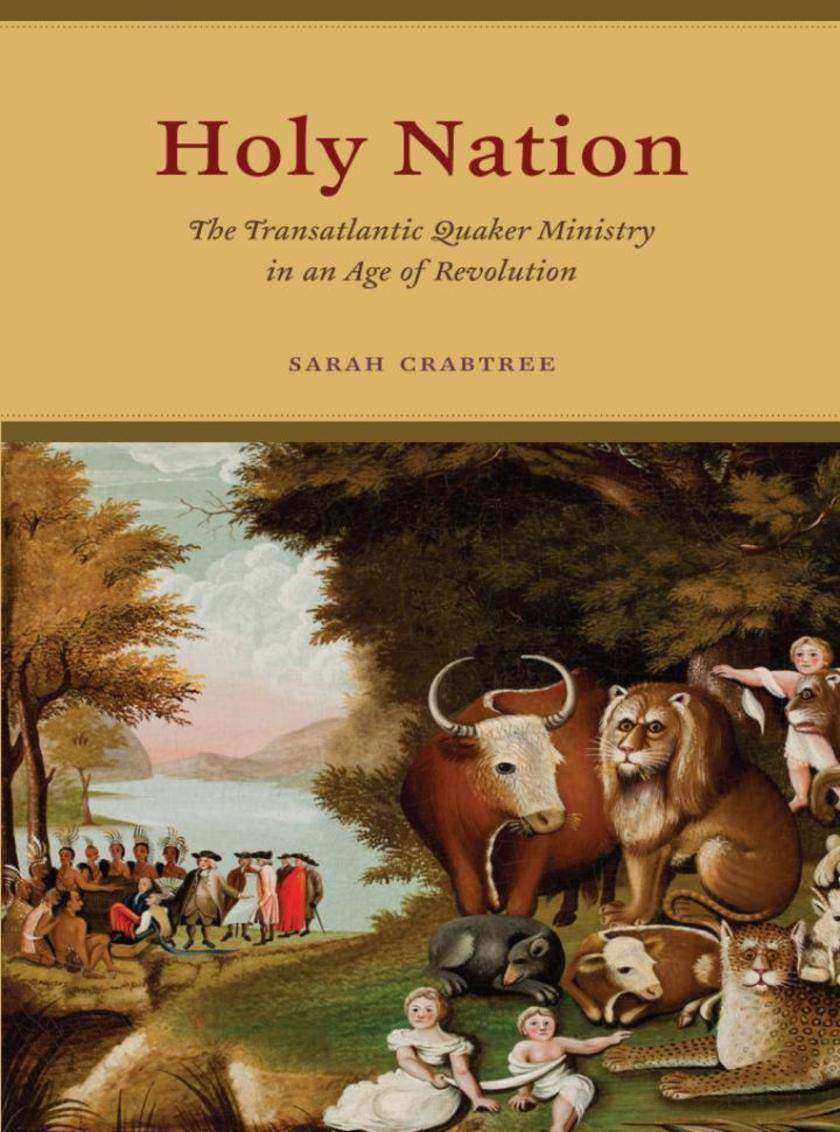
Holy Nation
¥370.82
Early American Quakers have long been perceived as retiring separatists, but in Holy Nation Sarah Crabtree transforms our historical understanding of the sect by drawing on the sermons, diaries, and correspondence of Quakers themselves. Situating Quakerism within the larger intellectual and religious undercurrents of the Atlantic World, Crabtree shows how Quakers forged a paradoxical sense of their place in the world as militant warriors fighting for peace. She argues that during the turbulent Age of Revolution and Reaction, the Religious Society of Friends forged a "e;holy nation,"e; a transnational community of like-minded believers committed first and foremost to divine law and to one another. Declaring themselves citizens of their own nation served to underscore the decidedly unholy nature of the nation-state, worldly governments, and profane laws. As a result, campaigns of persecution against the Friends escalated as those in power moved to declare Quakers aliens and traitors to their home countries.Holy Nation convincingly shows that ideals and actions were inseparable for the Society of Friends, yielding an account of Quakerism that is simultaneously a history of the faith and its adherents and a history of its confrontations with the wider world. Ultimately, Crabtree argues, the conflicts experienced between obligations of church and state that Quakers faced can illuminate similar contemporary struggles.
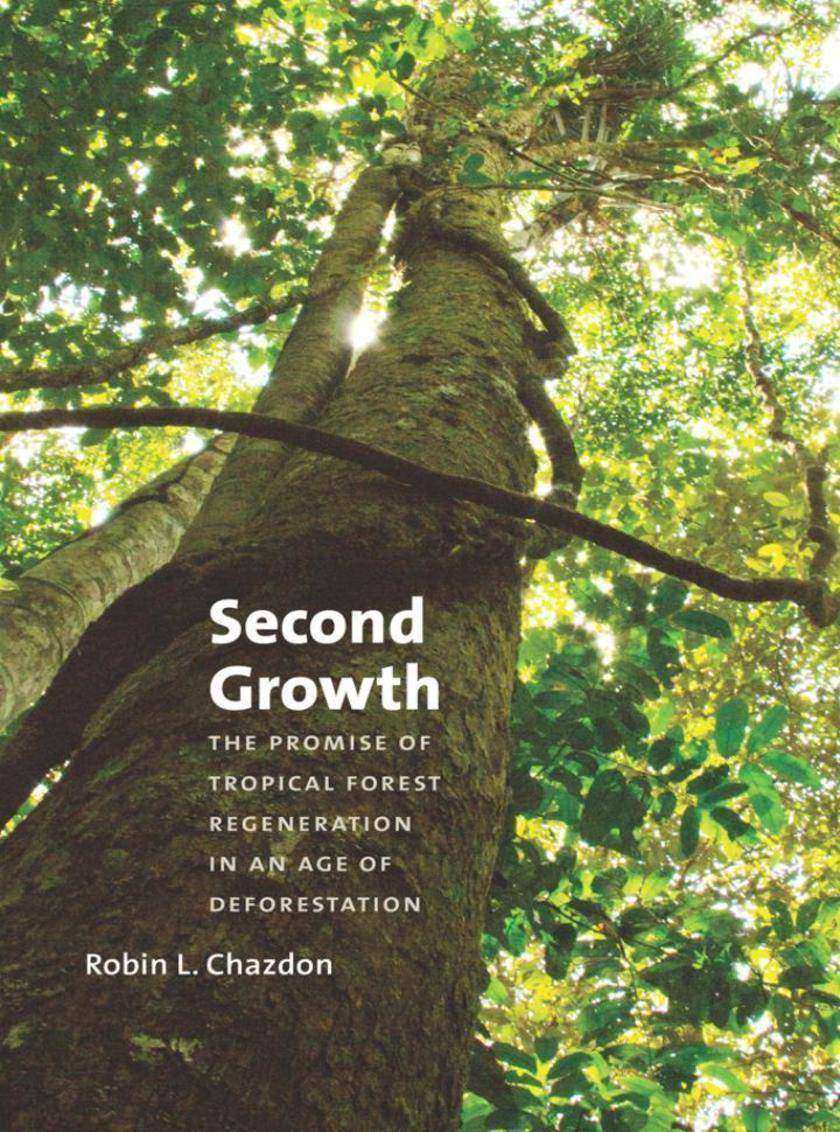
Second Growth
¥370.82
For decades, conservation and research initiatives in tropical forests have focused almost exclusively on old-growth forests because scientists believed that these "e;pristine"e; ecosystems housed superior levels of biodiversity. With Second Growth, Robin L. Chazdon reveals those assumptions to be largely false, bringing to the fore the previously overlooked counterpart to old-growth forest: second growth.Even as human activities result in extensive fragmentation and deforestation, tropical forests demonstrate a great capacity for natural and human-aided regeneration. Although these damaged landscapes can take centuries to regain the characteristics of old growth, Chazdon shows here that regenerating-or second-growth-forests are vital, dynamic reservoirs of biodiversity and environmental services. What is more, they always have been.With chapters on the roles these forests play in carbon and nutrient cycling, sustaining biodiversity, providing timber and non-timber products, and integrated agriculture, Second Growth not only offers a thorough and wide-ranging overview of successional and restoration pathways, but also underscores the need to conserve, and further study, regenerating tropical forests in an attempt to inspire a new age of local and global stewardship.
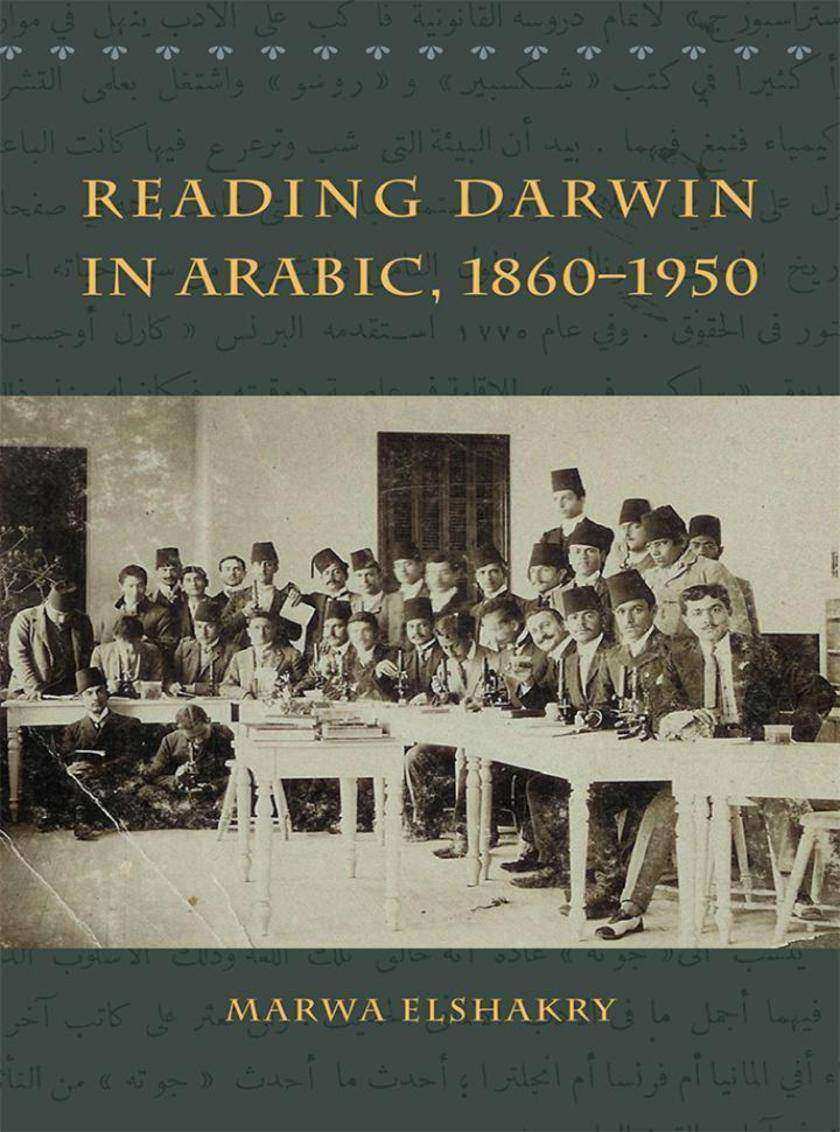
Reading Darwin in Arabic, 1860-1950
¥370.82
In Reading Darwin in Arabic, Marwa Elshakry questions current ideas about Islam, science, and secularism by exploring the ways in which Darwin was read in Arabic from the late 1860s to the mid-twentieth century. Borrowing from translation and reading studies and weaving together the history of science with intellectual history, she explores Darwin's global appeal from the perspective of several generations of Arabic readers and shows how Darwin's writings helped alter the social and epistemological landscape of the Arab learned classes.?Providing a close textual, political, and institutional analysis of the tremendous interest in Darwin's ideas and other works on evolution, Elshakry shows how, in an age of massive regional and international political upheaval, these readings were suffused with the anxieties of empire and civilizational decline. The politics of evolution infiltrated Arabic discussions of pedagogy, progress, and the very sense of history. They also led to a literary and conceptual transformation of notions of science and religion themselves. Darwin thus became a vehicle for discussing *ural exegesis, the conditions of belief, and cosmological views more broadly. The book also acquaints readers with Muslim and Christian intellectuals, bureaucrats, and theologians, and concludes by exploring Darwin's waning influence on public and intellectual life in the Arab world after World War I.?Reading Darwin in Arabic is an engaging and powerfully argued reconceptualization of the intellectual and political history of the Middle East.

The Sharpe Collection: Books #12-15
¥370.74
The Sharpe Collection: Books #12-15 by Bernard Cornwell has de*ive copy which is not yet available from the Publisher.

知行合一王阳明大全集(全六册)
¥370.60
度阴山从传记、四句教、家书、传习录手,层层深,日日练习和实践,为广大心学爱好者梳理出了理解王阳明的框架与脉络。 ◆传记:王阳明的一生就是一部心学案例集! ◆四句教:这四句话既是阳明心学的核心,也是适合初学者的门径。 ◆家书:逐字逐句解读王阳明的12条家训、24封家书,逐字逐句解读得透彻明晰。 ◆传习录:《传习录》是王阳明的语录和书信集,是了解心学不可不读的传世经典。在本书中,度阴山通过108个有趣的历史故事,透彻解读《传习录》中的“心即理”“知行合一”“致良知”等心学概念。 ◆心学日课21天:提炼21个核心新学概念,每天只用学一个!每天都在事上练,21天养成心学思维习惯!

中国历代通俗演义大全集(套装共36册)
¥370.00
"本套书主要包括《草木春秋演义》《元史演义 》《青红帮演义》《贵妃艳史演义》《貂蝉艳史演义》《隋唐演义》《两晋演义》《残唐五代史演义传》《北史演义》等共46册。 《草木春秋演义》是一本章回体小说,其想象依托中医药知识,不但文采飞扬,幽默风趣,更寓中医药知识于娱乐之中,堪称本草知识人文化的典型。《草木春秋演义》属于典型的寓言类小说,适合寄托言志,作者以神怪故事为依托,隐喻清朝现实矛盾,含蕴丰富,耐人咀嚼。 《隋唐演义》讲述了从隋朝末年开始,因隋炀帝荒淫无道,陷害忠良,以致朝纲不振,民不聊生,致使天下大乱,群雄揭竿而起;以瓦岗寨众英雄为首的各路起义军,匡扶正义,反抗暴政,推翻了隋朝统治,直到唐王朝建立、李世民称帝再到武则天执政、安史之乱这一时期的传奇故事,再现了那个风云变幻、英雄辈出的历史年代。 《两晋演义》再现了中华文明历史演进波澜壮阔的历程,讲述了晋代的兴亡。从司马炎代魏开始,终至刘宋代晋,经历了156年。 西晋结束了将近百年的分裂局面,但是经历八王之乱,国本消耗,和汉人杂处的胡人趁机陆续发难,终导致西晋覆亡。东晋在江东重建,开始了艰难北伐,因内部权力争夺使得实力大减。大将刘裕脱颖而出,两次北伐,收复长安,接连废黜两位皇帝,建立了宋,东晋灭亡。 这些历史故事好看有趣,适合消遣阅读,性价比高,值得收藏。"

剧情烧脑精彩,文风轻松欢脱:女频小说精选集(共9册)
¥369.99
剧情烧脑精彩,文风轻松欢脱,女频小说精选9册集。《成何体统:全2册》《有药》《满城春》《饮鸩》《腊月初八奇事录》《梦回三生》《画瓷》《长夜幻歌》《长夜幻歌2》

中国历代通俗演义大全集(套装共36册)
¥369.99
暂无
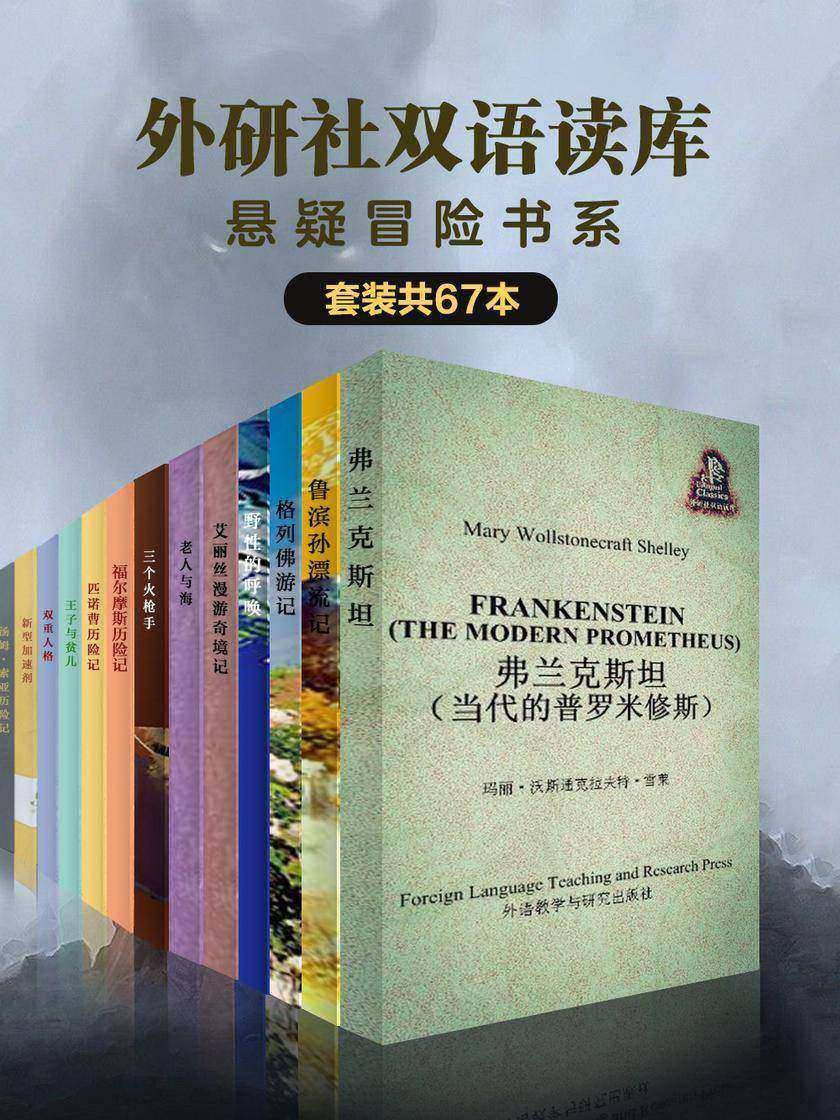
《外研社双语读库·悬疑冒险书系》(套装共67本)(外研社出品!科幻、冒险、侦探、悬疑一键定制,强大的脑洞与严谨的逻辑,找到“世界上第一部真正意义上的科幻小说”)
¥369.99
《外研社双语读库·悬疑冒险书系》(套装共67本),包含《80天环游世界》《艾丽丝漫游奇境记》《艾伦·特罗》《爱的力量》《悲情人生》《彼得·潘》《变形记》《船员轶事》《从地球到月球》《地下城》《弗兰克斯坦》《扶乩》《福尔摩斯归来》《福尔摩斯回忆录》《福尔摩斯历险记》《歌利亚》《格列佛游记》《黑人渔夫萨姆历险记》《红房子旅馆》《黄泉歧路》《金银岛》《掘金者》《坎特维尔的幽灵》《老人与海》《利欲熏心》《鲁滨孙漂流记》《绿野仙踪》《螺丝在拧紧》《马丁·伊登》《毛猿》《没有被斗败的人》《玫瑰对柏树做了什么》《墨西哥人》《内河航行记》《男人和酒》《讴歌生命》《叛逃者》《匹诺曹历险记》《普鲁士军官》《人心险恶》《人与自然》《入侵》《三个火枪手》《蛇蝎美人》《石榴屋童话集》《弑亲及其他》《兽亦有情》《双面人心》《双重人格》《汤姆·索亚历险记》《汤姆·索耶在国外》《铁蹄》《王子与贫儿》《小王子》《新型加速剂》《血字的研究·四签名》《野性的呼唤》《一位神经质先生所说的奇异故事》《伊凡·伊里奇之死》《意大利强盗》《因为爱情》《战乱那些事儿》《战争岁月》《志士英雄》《致命黄金》《走投无路》《后一块净土》

北欧悬疑小说天王:尤 · 奈斯博作品集(共15册)
¥369.99
本套书是北欧悬疑小说天王尤·奈斯博*全警探悬疑小说。 按顺序解锁哈利·霍勒系列探案史(全15册) 分别为《蝙蝠》《蟑螂》《知更鸟》《复仇者》《五星芒》《救赎者》《雪人》《猎豹:全二册》《幽灵》《警察》《焦渴》《刀锋》和独立暗黑作品《雪地之血》《猎头游戏》《夜行之子》

杨周翰作品集
¥369.00
《十七世纪英国文学》是杨周翰先生运用比较的方法,从广阔的视野和全新的角度,来研究17世纪英国文学的一部力著。他以17世纪英国文学为突破口,把17世纪文学放在历史的背景下考察,以一些虽然影响深远但却少人问津的作家为切,揭示了17世纪英国文学的风尚和思潮,发掘出17世纪英国文学在思想史和文学史上的独特意义。它从一个全新的角度重写了英国十七世纪文学的历史,杨周翰先生并非囿于经典文学,而是把一些不为以往的文学史家所关注的文类和文化现象,例如悼亡诗等,纳自己研究的范围,并从中国学者的独特视角出发比较研究了中国古代的悼亡诗,从而得出了一些全新的结论。

A Book of Britain: The Lore, Landscape and Heritage of a Treasured Countryside
¥368.46
In this remarkable, landmark publication, countryman Sir Johnny Scott evokes all that is romantic about the British countryside, its people, customs and traditions. Over its 600 gloriously illustrated pages, Johnny draws on his wisdom and knowledge to reveal a forgotten culture, and encourages us all to rediscover a beautiful Britain. “I always think of nightingales when spring arrives in the south of England and winter is still reluctant to release its grip north of the Border. I heard my first as a very small child while staying with my grandparents on the Ashdown Forest. My sister woke me one night with an excited whisper, 'A nightingale! You must listen to the nightingale sing!' Together we sat on the window seat, gazing across moonlit lawns towards the forest. At that moment, as if nature had not already done enough to impress, the most wonderful sound I had ever heard filled the silence, as the nightingale started to sing. A rapid succession of varied, unconstructed notes, some harsh, some liquid, sung with great exuberance and vigour, changed to a long, slow, pleading song that rose in volume to a sudden piteous crescendo, before reverting to a tune of jollity and mirth. In my mind's eye I saw it erect and glowing, somewhere in the darkness among the oak trees, but no amount of searching that morning produced a single golden feather.” Throughout the pages of A Book of Britain, Johnny Scott celebrates the landscape and people and reveals why, through centuries of careful management, conservation and cultivation, Britain looks as it does. We discover Royal forests and protected oaks; learn animal behaviour and how best to observe wildlife whether on the moors or in your garden; we learn about traditional country sports from familiar hobbies such as fishing and shooting to lesser-known activities such as “swan upping”. Johnny teaches us to look to animals and nature to predict the weather, and reveals many customs and traditions that are in danger of being lost. This book is a gift in every sense – not only in its sheer scope and presence, but in the rich legacy it will leave behind for future generations.

了不起的自己(套装共15册)
¥368.00
本套装包括:《你的自信,所向披靡》、《超越自卑:如何运用同理心战胜自卑感》、《清零,做自己的人生修缮师》、《内在勇气:康熙来了特邀心理专家为你量身打造自信人生!》、《总有一天你会变成自己喜欢的样子:销量破亿,席卷全球50多个国家的励志经典!》、《与内心的冲突和解:激发人生动力的内在成长课!》、《真正的接纳,就是爱上不完美的自己》、《如何才能不羞怯》、《与真实的自己和解(不是对现实妥协,而是全然接纳和善待自己)》、《如何才能没压力:遇见内心平衡的自己》、《阳光的你,抑郁了吗?:做自己情绪的主人,告别“微笑型抑郁症”!》、《心的重建:生命中的失去,就是重整命运的机会》、《如何宠爱自己的心:生活中的心理妙招》、《美好的人生都是自己争取的:聪明女人要懂得71个职场细节》、《自卑与超越》
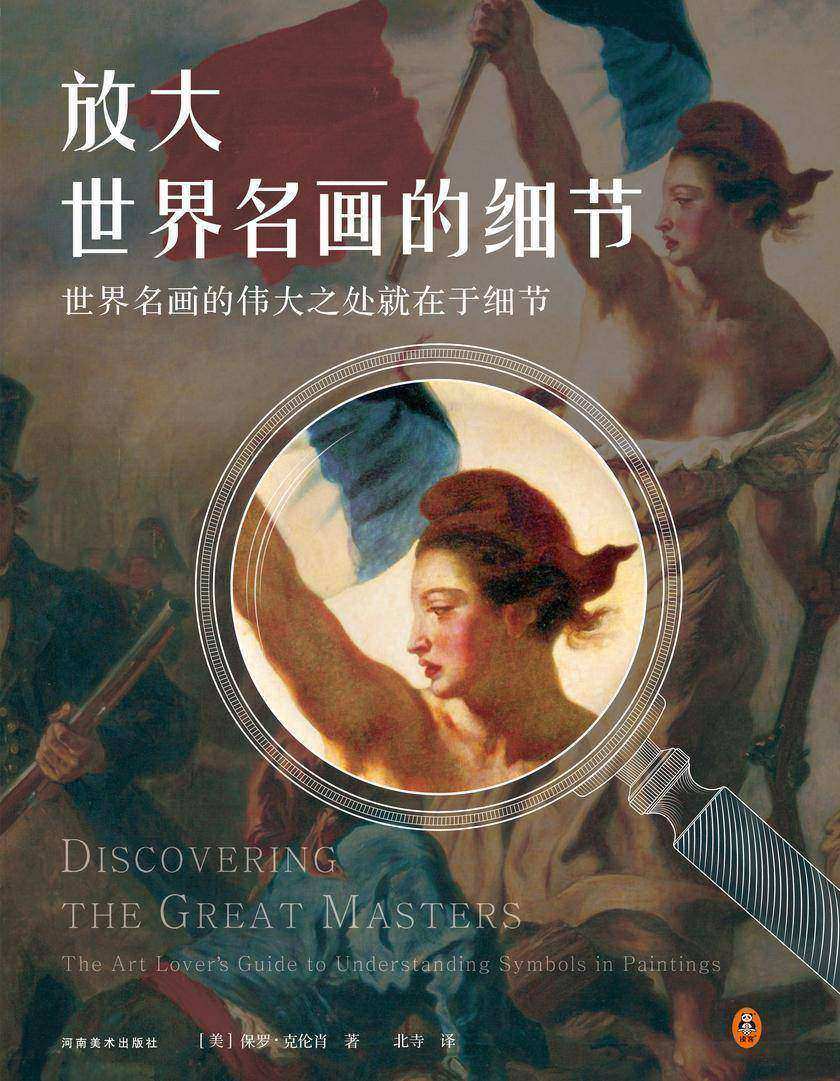
放大世界名画的细节(世界名画的伟大之处就在于细节。51位艺术大师,62幅世界名画,303个伟大细节,带你发现世界名画的伟大细节。)
¥368.00
本书收纳了14世纪至19世纪杰出大师的60余幅名画,带我们近距离洞察领略达•芬奇、米朗基罗、拉斐尔、乔托、波提切利、丢勒、提香、鲁本斯、杨•凡•艾克、维米尔、安格尔等艺术巨匠不朽的艺术魅力。内容紧扣名画本身,或全貌、或局部地解读藏在名画的秘密,让我们彻底读懂看似不经意却蕴含着小秘密的名画中出现的元素是什么,它们为什么会出现,以及它们蕴含的意义。

放大伟大建筑的细节(伟大建筑的伟大之处就在于细节。17个国家,50座传世建筑,158个伟大细节,带你发现伟大建筑的伟大细节。)
¥368.00
本书收纳了全球17个国家50座传世建筑的详细讲解,从中国的长城、法国的埃菲尔铁塔到印度的泰姬玛哈陵,本书按时间顺序排列,展示了各种流派的建筑,涵盖了超过两千年的建筑历史。丰富的图片、详细的解说使读者能够欣赏过去和现在的建筑,同时也能步一了解建筑师的技术成就和美学光彩。

二月河文集:全新修订彩插珍藏版(康熙+雍正+乾隆套装全十三册)【中国当代历史小说里程碑之作二十世纪中文小说一百强。】
¥368.00
《乾隆皇帝》是二月河创作之系列长篇历史小说,全书共分为6卷。第1卷为《乾隆皇帝·风华初露》。雍正猝死,乾隆继位,立志要创清王朝的极盛之世,主张“以宽为政”,纠正前朝的严刑苛政,平反错案,使杨名时、史贻直、孙嘉淦、张照等前朝受害者得以复出,重新授以要职,继续为朝廷效命。乾隆认为,粉饰来的太平,终究要露馅儿,他根本不相信一些奏折中的所谓“民殷富而乐业”的假话。为了深民间了解官风民情,他先后前往河南和山西太原微服私访,体察民间疾苦和官场实况,发现有才华的年轻人才,为整饬吏治、拔擢新人做到心中有数。整饬吏治首先惩治了一批贪官污吏。侵吞巨款、毒杀奉派前来清查的上级官员的德州知府刘康;大肆受贿的山西布政使萨哈谅;贿卖文武生员的山西学政喀尔钦等都被正法,受到严惩。乾隆有别于前朝的某些作为,有人非议,他们散布谣言炮制假奏折,把已发现有人咒骂皇上字迹的杨名时暗害致死,并企图通过所谓七司衙门掌握宿卫大权,而废掉乾隆。乾隆在获得准确情报后,果断地抓捕了从事阴谋活动的少数宗室子弟,除首恶分子永远圈禁外,余均从轻发落,一反前朝骨肉相残、大肆诛戮的做法,顺利清除了潜藏的隐患。第2卷为《乾隆皇帝·夕照空山》。壮年时的乾隆已基本完成父王遗志走向成熟。此时,他踌躇满志,锐意取,全力投创建清王朝的极盛之世的大业之中。他力排众议,恢复先祖创建的木兰秋狝以整饬军队;赈灾放粮,稳定民心,缉拿反贼,以防民变;用兵金川,以安社稷;勘查民情,以整顿政务;征借民间古籍,编纂旷古大书《四库全书》。 然而出兵大小金川,用兵无效,一败再败,庸臣误国,丧师辱君;缉拿反叛朝廷的首领“一枝花”行动屡次失利,而秘运65万军饷反被“一枝花”所劫;为编纂《四库全书》向民间士臣征借典籍又遭抵制。同时,富察皇后重疾垂危,皇七子染痘病死,皇宫内暗藏凶机。在这国事家事连连受挫之际,乾隆仍奋发上,坚忍不拔,为清王朝的极盛日夜勤政不息。第3卷为《乾隆皇帝·日落长河》。清廷十几万大军征剿金川反叛土司莎罗奔所率的三万余藏军,结果惨败,被迫达成屈辱蒙羞的城下之盟。乾隆忍痛诛戮主帅皇亲讷亲,另派军机处大臣傅恒再行征讨。还未抵达战区,傅恒即在地方欢迎仪式上险遭一群化装成苗家舞女的藏民刺杀。为避讷亲的杀忠饰过,“逃将”海兰察和兆惠,一在闹市锄暴救弱,一在牢中怒杀狱霸;皇家侍卫黄天霸手下和南京地方豪士较技夸能,其后又追捕易瑛为首的“一枝花”党徒。这些大小“武戏”故事,写来一波三折,悬念不断,扣人心弦。“文戏”则有刑部侍郎刘墉潜金陵,乔装私访大臣贪渎案件和“一枝花”党徒的行踪,协助确保乾隆出访江南的安全;新任两江总督、身携皇上密旨的尹继善,机敏果断,计扣大贪污犯、“国舅爷”高恒;不识时务、老而贪得的三朝元老张廷玉突然失宠、自取斥辱;无耻官员不惜献出妻妾取悦上宪,以图晋升;军机大臣纪昀以脚板皮作饺子馅戏弄巴结攀附者;曹雪芹故交敦诚、敦敏深怀旧情,探访雪芹遗孀,等等,读来也都兴味盎然又给人启迪。诸多人物的个性,如乾隆皇帝的聪察,喜欢识见超卓的能员,但又要显示自己高出一头的自矜,欲做文治武功完人的奢想;刑部尚书刘统勋的勤勉恭谨;有诸葛风的傅恒的深沉智虑、雍容雅量;纪昀的应对机敏,博学多智;兆惠的严肃刚直,海兰察的粗中有细;莎罗奔的富于谋略;以及讷亲的志大才疏、刚愎自用,高恒的荒淫、贪婪等,都在大大小小的“武戏”“文戏”中得到鲜明丰满的表现。第4卷为《乾隆皇帝·天步维艰》。乾隆皇帝巡幸江南,傅恒用兵大小金川,本卷围绕这两条主要线索,铺陈了壮年乾隆的文治武功,塑造了刘统勋、纪昀、傅恒、窦光鼐等一批官员的形象,刻画出了棠儿、朵云等或刚强或柔弱的众多女子。乾隆巡幸江南,歌舞升平景象背后,时见饥盗为患,贪渎滋生。女教主“一枝花”余党流窜山东,少年福康安与刘墉以钦差大臣身份运筹谋划一举擒魁。甘肃总督勒尔瑾、王亶望与通省官员上下其手,民不聊生,弘昼、和珅、阿桂微服私访,密折弹劾封疆大吏。然而,和珅历难时运初交,贪渎之心初露。傅恒身为宰辅,御命大小金川用兵,急欲雪耻荡平莎罗奔合族军民。莎罗奔之妻藏族女子朵云闯京师劫人质,江南又邂逅乾隆。终遂其所愿,乾隆派岳钟麒阵前宣旨,大小金川罢兵。朵云身负重任,视死如归,巾帼豪气跃然纸上。该卷情节承上启下,独立成卷又相对统一,保持了作家一贯的艺术特色。第5卷为《乾隆皇帝·云暗凤阙》。正如年逾耳顺的乾隆无法抗拒自己身体的衰疲一样,走过了中国封建社会*后一个鼎盛之世的乾隆王朝也已日显老态,虽然表面上还维持着锦衣玉食,歌舞升平,其实却已矛盾四起,危机四伏。官吏贪贿淫逸,百姓食不果腹,盗匪蜂起作乱,边境日益不宁……面对“按下葫芦起了瓢”的尴尬时局,乾隆一如既往,竭尽全力,宵旰勤政。他重用阿桂、于敏中、刘墉、李侍尧、和等为肱股大臣,弥补因傅恒、尹继善病逝带来的权力真空,着力整顿政务军务内务:惩国贪,济万民;定西域,靖匪患;历练王子,清理内宫……但是迫于情势,乾隆往往也不得不投鼠忌器,只能就事论事,到而止。更可怕的是,由于他用人独持己见,一意孤行,导致奸臣和珅始扶摇直上,窃居高位,埋下了巨大的祸根。二月河在本卷中保持了其一贯的艺术风格。将封建宫廷官场的权谋机诈刻画得淋漓尽致,木三分;叙述故事绘声绘色,惟妙惟肖;构织情节跌宕起伏,波谲云诡;语言则有《红楼》之韵,拟古之美,读来口齿生香。第6卷为《乾隆皇帝·秋声紫苑》。乾隆晚年,烽火迭连,四川的大小金川土司、新疆的和卓木霍集占、盘据在尼泊尔边境的廓尔喀、台湾的林爽文等相继叛乱;直隶湖广等地,白莲教、天地会……民变此起彼伏。连年征战,国库空虚。而朝廷以和珅为代表的佞臣,一面媚主,投乾隆之所好,一面以保举地方官等办法,结成盘根错节的关系网,黑手伸向各省州府。和珅在建造圆明园的督工中,中饱大量银子。山东巡抚贿赂和珅的70万两均来自民脂民膏,平邑县的饥民们只得上龟蒙顶当土匪。和珅的爪牙把铜运至海边走私,连船卖给日本。诸如此类案件层出不穷,因有乾隆的偏袒,和珅手段的隐蔽毒辣,难以破案。他们还陷害忠良,查案人钱沣被毒死于半路,连纪晓岚也被充军新疆。但是,作为一代英主的乾隆,自己警觉年事太高,精力不济,秋声萧萧,黄叶待落,必须物色太子人选。以十五阿哥颙琰*受青睐。本书就从颙琰去各地历练始,写至乾隆85岁那年将帝位禅让给儿子颙琰,是为嘉庆。本书有两条主线:一是雄姿英发天生帅才的福康安及名将兆惠、海兰察等,他们连年征战在外,保住了乾隆的江山和版图的完整;二是奸佞贪婪胁肩谄笑的和珅,他像阴影一样伴随着乾隆的晚年。
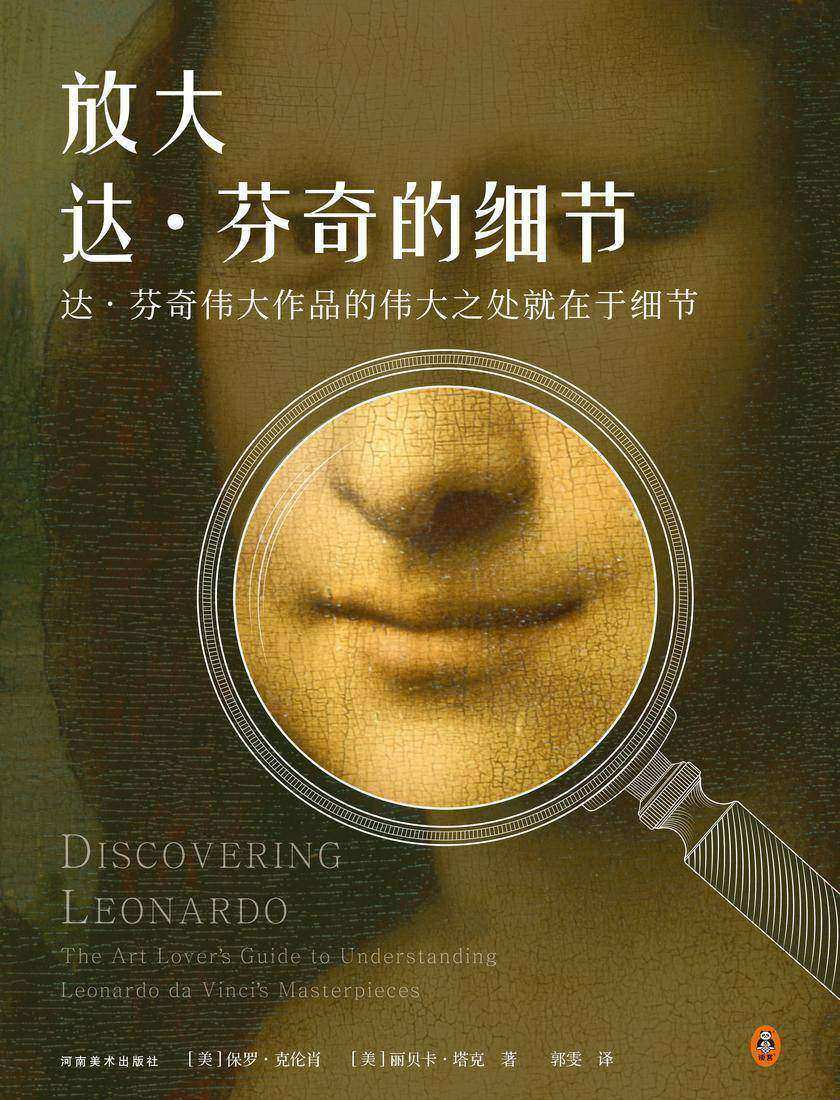
放大达·芬奇的细节(《蒙娜丽莎》《zui后的晚餐》《维特鲁威人》精选50幅传世名作,还原一代旷世奇才达·芬奇的伟大之处!)
¥368.00
精选50幅达·芬奇杰作背后的象征和意义,还原一代奇才达·芬奇的创作轨迹,包含圣母玛利亚、圣徒、使徒等闻名于世的人物肖像画,还有他为机械和军事所做的创作等。同时,作者还从达芬奇的同辈人中精选了同类型的创作来与达·芬奇的创作形成联系。全书紧扣达·芬奇艺术杰作本身,或全貌、或局部地解读藏在艺术杰作中的秘密,让我们彻底读懂杰作的意义。同时,透过模切窗口,让我们的眼睛更便捷地聚焦于画面的细节,增强了欣赏每幅杰作的趣味性。

文景古典·名译插图本:欧里庇得斯悲剧集(全十八册)
¥368.00
《欧里庇得斯悲剧集》收集了古希腊悲剧作家欧里庇得斯全部完整的传世剧本,包括《阿尔刻提斯》《美狄亚》《希波吕托斯》《赫剌克勒斯的儿女》《安德洛玛刻》《赫卡柏》《请愿的妇女》《特洛亚妇女》《伊菲革涅亚在陶洛人里》《海伦》《俄瑞斯忒斯》《疯狂的赫剌克勒斯》《伊翁》《厄勒克特拉》《腓尼基妇女》《在奥利斯的伊菲革涅亚》《酒神的伴侣》《圆目巨人》等十八部作品。欧里庇得斯是对后代欧洲戏剧发展影响*的古希腊悲剧家,他将普通人的日常生活带上舞台,其作品呈现出鲜明的社会问题,塑造了一些重要的普通人形象,也展现出深刻的心理描写,是古希腊悲剧发展中的革新者。
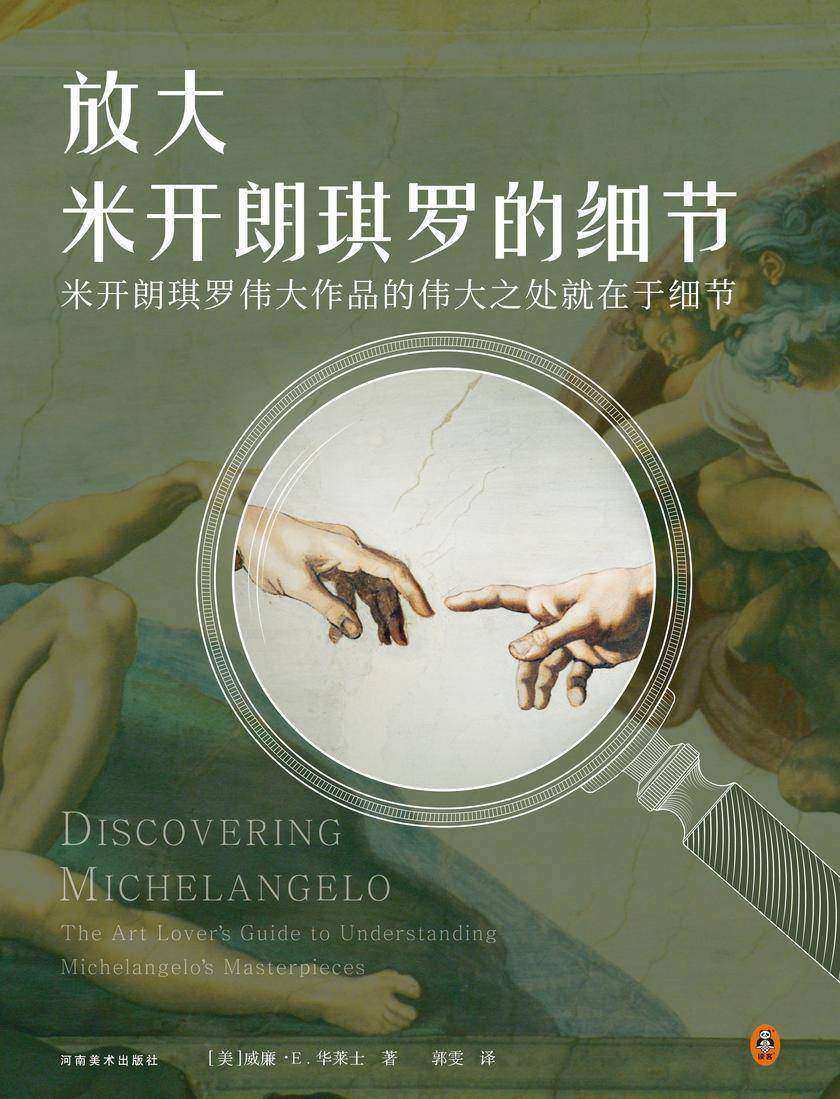
放大米开朗琪罗的细节(《大卫》《创造亚当(西斯廷教堂穹顶)》精选50幅传世名作,发现米开朗琪罗一生杰作的伟大之处!)
¥368.00
剖析米朗琪罗创作的绘画、素描和雕塑背后的故事,还原一代奇才米朗琪罗的创作轨迹。全书紧扣米朗琪罗艺术杰作本身,或全貌、或局部地解读藏在艺术杰作背后的历史、象征和秘密,让我们彻底读懂杰作的意义。同时,采用模切窗口的工艺,让我们的眼睛更便捷地聚焦于画面的细节,增强欣赏每幅杰作的趣味性。

医道正途(全7册)
¥368.00
知名大神作家二雷大叔继《王牌狙击手》之后,又一部都市口碑神作! 不一样的神医文,一样的令人热血沸腾!直呼过瘾,欲罢不能! 热血、正能量、不浮夸、大格局! 当医生拥有超能力,他会走正道,拯救世界吗? 一个天才医生的成长之路…… 一段自我救赎与超越…… 一场正义与邪恶的交锋…… …… 林北出身中医世家,从小勤学苦练立志成为那名满天下的神医。 然而现实却没有他想象的那么简单, 权力、金钱、美色……种种诱惑,身怀绝世医术和*能力的他能否抵挡? 人性的善与恶、世间的正义与黑暗,他又将如何分辨…… 翻开本书,看一代神医如何惩恶扬善、针砭时弊、拯救世界。
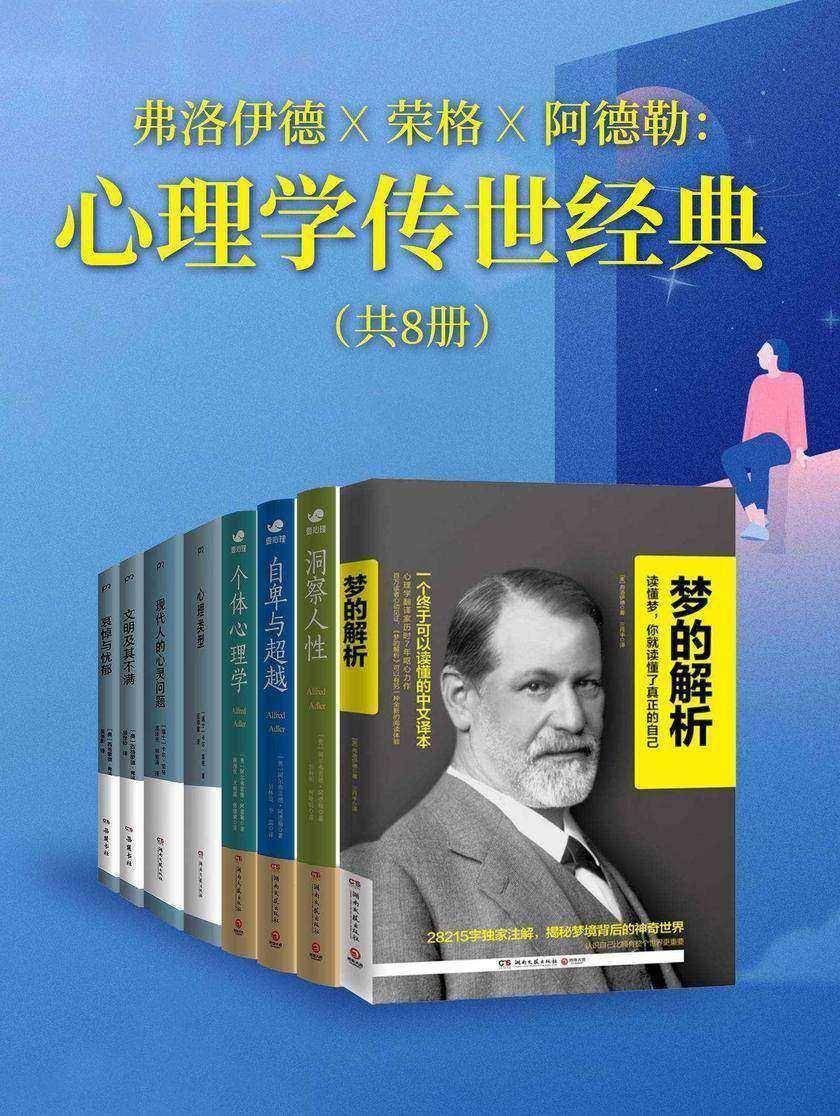
弗洛伊德X荣格X阿德勒:心理学传世经典(共8册)
¥367.99
弗洛伊德X荣格X阿德勒:心理学传世经典。套装共8册,分别为《梦的解析:一个终于可以读懂的中文译本》《哀悼与忧郁》《文明及其不满》《现代人的心灵问题》《心理类型》《自卑与超越》《洞察人性》《个体心理学》




 购物车
购物车 个人中心
个人中心



